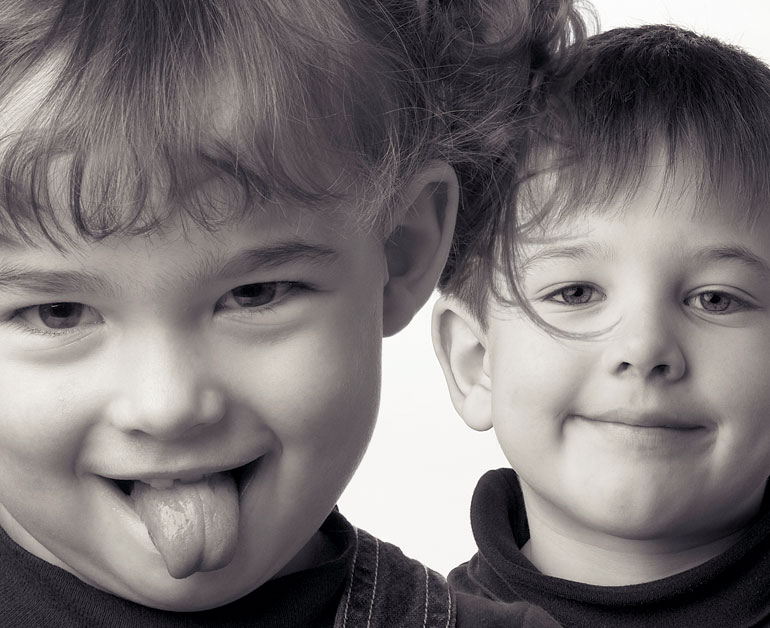You’ve attended workshops, read all of the expert advice, rehearsed the story, and you plan to start talking to your young child about adoption…any day now.
Except that your mother questions the need to talk about the subject (“He’s too young to understand”). And your best friend suggests waiting until your son brings it up (“so you don’t put ideas in his head”). And you find yourself stuttering when you try to say “birth mother” or “you didn’t grow in my tummy.”
The first couple of times my daughter asked about adoption, I felt tongue-tied by a flood of emotion: sadness for her birth mother, discomfort about my infertility, fear that I would say the wrong thing to her and damage her tiny psyche.
Even though adoption has moved toward openness, telling young children about it can be hard. Yet all the experts agree: We have to do it. And the younger we start, the better.
Why Should You Talk About It?
Babies don’t stay babies forever — and it doesn’t take long for children to reach the age when they start to wonder where babies come from, and whether they were “in your tummy.” At about three, your child begins to comprehend pregnancy and birth, and will ask you about his birth story. But you can start the conversations even earlier.
“The best experiences are when children say, ‘I just always knew I was adopted,’” says Ronny Diamond, director of the Adoption Consultation Team at Spence-Chapin in New York City. She compares adoption to gender: There’s no one time to inform your child that she is a girl. Most children can’t remember a time they did not know their gender.
But even if your child understands the basics of his story, he’ll probably misunderstand a few parts of it. By talking about adoption early and often, you’ll also be able to get misconceptions out into the open, so you can clear them up.
Young children think the whole world revolves around them and that they magically cause the events in their lives, so some may believe they brought about their own adoption. A child may think that her birth mother didn’t “keep” her because she was flawed in some way. Another common misconception of young adopted children is that they weren’t born like others, but that they somehow sprang to life in an airplane or an orphanage.
Kids also tend to think everyone else is like them. When I drove my daughter through my hometown, telling her I was born there, she asked if my birth mother still lived there. Until that moment, I’d never realized that she thought everyone was adopted.
It’s good to foster positive attitudes about adoption while your child still thinks you know everything. “Children will spend their lives hearing from the rest of the world that adoption is somehow second-rate; it is very important that parents instill a more positive view of adoption in their young children, before they start to encounter those negative views,” says Sarah Springer, M.D., chair of the American Academy of Pediatrics’ Section on Adoption and Foster Care and an adoptive mother of two.
She Said…
Grace asked, “What is ‘adopted’?” Then, before I could say anything, she said, “It’s when your parents love you very much!” (Lyn Milliman, mom to Grace, 3, from Vietnam)
Sometimes negative societal views even impose themselves on us as adoptive parents. Research conducted by Mary Watkins and Susan Fisher for their useful book, Talking with Young Children About Adoption, suggests that many parents feel sadness, dread, and anxiety when they think about discussing adoption with their children.
I’ll admit that I’m one of those parents. The first time I said “your birth mother” to my daughter, the words stuck in my throat. Luckily, she was two, and too young to notice, but the experience made me aware that I needed lots of practice. Out came the books, and I read I Love You Like Crazy Cakes until I could get through the last page without choking up.
“Early discussions about adoption are as much for the parent as they are for the child,” says Jayne Schooler, coauthor of Telling the Truth to Your Adopted or Foster Child. “By talking about it early and often, parents will grow in their comfort level of sharing more details with the child.”
The good news is that most parents who talk openly — even if they have to force it at first — will become much more comfortable and matter-of-fact about the realities of adoption. “Starting to talk about it early is probably the best thing,” says reader Christina Katos. “When the time comes for questions, you aren’t as nervous. It seems as normal as talking about what’s for dinner.”
How Do I Start?
Okay, so you’ve decided to start talking. But your child is as interested in hearing about adoption as in reading Crime and Punishment. She’d rather play. What do you do?
He Said…
Last year I attended a baby shower with my three-year-old son, Logan Nikolai. He said (pointing at the mommy-to-be): “She has a baby in her tummy.” I said, “Yes, she does.” He said, “But I was never in your tummy, was I?” I said, “No, sweetie, you weren’t” (preparing myself for an in-depth conversation about biology). He said, “That’s ‘cause you didn’t eat me!” (Michelle Bartz, mom to Logan Nikolai, 3, from Russia)
Some smart parents incorporate play into their adoption talk. Reader Stephanie Nasso, of Buffalo, New York, tells her young daughter’s adoption story in short sentences, with airplane sound effects, and ends with, “Who is our baby girl?” That’s Lily’s cue to shout, “Me,” and run to hug her parents.
Books are another easy way to bring up adoption. Most libraries have picture books about adoption, but it’s a good idea to own a few, so that they’re available when the time is right. Springer advises mixing adoption books in with the child’s other favorites, rather than keeping them on some special, out-of-reach shelf. That way, the child can choose when she wants to hear an adoption story.
And you can make your own book. I typed out a simple version of my daughter’s adoption story, illustrated it with a few snapshots from the adoption journey, and bound it in a plastic folder. It’s on her bookshelf, beside My Princess Treasury and Squids Will Be Squids, and every month or two she pulls it out for us to read.
“Even the books the child doesn’t fully understand can help create the warm, ongoing message that adoption is a wonderful way to come into a family,” says Schooler. “Books make a great foundation for storytelling as parents move from the stories to the child’s own special and unique history.”
And then there’s real life, full of pregnant neighbors and breastfeeding mothers and extended families that share, or don’t share, genetic traits. When you hear, “Mommy, why is that lady’s belly so big?,” it’s time to talk about women’s special place where babies grow. You can talk about a cousin’s inherited talents or features to discuss the birth-family origins of your adopted child’s traits.
He Said…
My friend (an adoptive mom) was explaining to her six-year-old that lots of birth moms parent their babies. She mentioned me as an example by saying, “Lauren’s mom is also her birth mom.” He responded, “Oh, gross!” (Heather Blake, mom to four biological kids and adopting a fifth from Ethiopia)
My daughter’s preschool class became fascinated with nursing after several of the kids got younger siblings. This led to a bathtime conversation about “is there milk in my chest? In yours?” I could have stopped with “no,” but I’m learning my lesson about openness. We had a nice little chat about birth mothers before moving on to washing Barbie’s hair.
What Exactly Do I Say?
Preschoolers need the bare-bones story, according to Diamond — the story any adoptive parent would give any adopted child. Even if you have much more information, start with the universal beginning: birth.
Example: You were inside your birth mom’s womb, waiting to be born, and she was worried because she couldn’t take care of any baby. So she took you to a place where people could take care of you. At the same time, we wished and hoped for a baby. When we heard about you, we knew you were our forever baby. We were so excited to meet you!
Other lines I’ve found useful:
- Some families are formed by birth, and some are formed by adoption. This helps your child learn that there are many different ways to create a family, and they’re all equally wonderful.
- Your birth mother couldn’t take care of any baby. This statement stresses that your child did nothing “wrong” that led to her adoption.
- We will be your forever family, even when you’re a grownup. Kids sometimes worry that you could decide to place them for adoption, too. Make sure you let your child know that adoption is for keeps, and that you’ll be there for her for the rest of your life.
- I wish you’d grown inside my tummy, too, but that’s not what happened. This last line responds to the common reaction as a child begins to understand adoption: “I wish I’d grown in your tummy.” He’s too young to understand genetics, to realize he wouldn’t have been the same person if he’d grown in your womb. But the desire for closeness is one you can meet with empathy. And with the reassurance all children need: “I love you just as much as if you’d grown in my tummy.”
You may want to think about which phrase you’ll use to describe your child’s birth mother. There are many different terms: birth mother, first mother, tummy mommy, China/Korea/Russia/Guatemala mommy, or even “the woman who gave birth to you.” If you have an open adoption, and the child has seen photos or had visits with the birth mother, you’ll probably refer to her by name.
She Said…
Quite loudly at the supermarket, my daughter exclaimed, “Mommy, I told you I want a baby sister from China, not a baby brother from Russia.” (As though I’d put Fruit Loops in the shopping cart instead of Honey Nut Cheerios.) Quite a logical assumption, given her frame of reference. (Joyce Bouchard, mom to Karina, 4, from Russia)
Some parents agonize over whether to include the fact that the birth mother has other children she is raising. For a preschooler, you don’t need to — unless you are the type who will worry about this fact until it’s out in the open. If so, put a photo of the birth mom with her other children in your child’s lifebook, and explain it simply: “Here’s Rhonda with her son, Jeremy. Jeremy was two when you were born, and she knew she couldn’t take care of a second baby, so she chose us to take care of you.”
Some details can wait until the child is seven or eight years old, when her questions will let you know that she can understand the specifics. Since young children don’t understand reproduction, telling them about unplanned pregnancy, rape, or even birth fathers won’t make much sense. For now, “general and happy” is better.
Springer uses the analogy of airplanes: Children love them, but they go from pointing them out in the sky as toddlers, to realizing that the giant plane at the airport is the same vehicle when they’re school-aged, to learning the physics of flight in high school or college.
“Since children won’t really understand airplanes until high school, does that mean we shouldn’t talk about airplanes until then?” she asks. “Of course not! Talking about adoption is the same way: Start with what they can understand, and let the details unfold over years, as the child’s development unfolds.”
He Said…
My son, Lucas, has pictures of his birth mother, Rhiana. A few months ago he said to me, “I was in Rhiana’s tummy, right?” I said yes. Then he asked, “How did I get in there?” After my fumbling answer, he asked the $64,000 question: “Where was I before I was in Rhiana’s tummy?” That one had me stumped! (Amy Dessaux, mom to Lucas, 5, from the U.S.)
What about the sweet line parents use: “You didn’t come from my tummy, you came from my heart”? “Too abstract for preschoolers,” says adoption counselor and author Holly van Gulden. “The same loving thought can be said differently: We did not conceive and give birth to you. We searched for you, and when we met you, we grew to love you.”
Springer agrees. “Preschoolers are very literal, and they can easily misinterpret the ‘you came from my heart’ idea,” which can evoke bizarre images of birth. She adds: “It’s also important for kids to know that they started out in life the same way everyone else did.”
A better way? “You grew in your birth mother’s tummy, like all babies grow in a woman’s tummy. But she wasn’t able to be a mom then, so she looked for someone else to be your parents, and that’s how we found each other. I’m so happy that we did!”
How Often?
If your preschooler doesn’t bring up adoption, you should. He may not have the words to phrase a question, or he may sense that the topic makes you uneasy. According to one expert, if you can’t remember the last time you talked about adoption, you’re due for a talk.
That doesn’t mean sitting down for an Official Discussion. In fact, Watkins and Fisher found that the best times for adoption talks were during informal transition times: car rides, chores, and bath times. During such periods, the relaxed togetherness lets the child’s mind roam to whatever is important to him, and adoption will sometimes top the list.
Putting Ideas into Her Head?
What about the worry that you’re putting ideas into her head or that you are somehow overemphasizing adoption?
“Adoption is an emotionally loaded topic for parents, but it’s really not, yet, for toddlers and preschoolers,” says Springer. “Children can and do switch the subject from adoption to the big yellow truck driving by in an instant.” If they know they can have questions answered anytime, they will tell you when they’re not interested in talking.
She Said…
I recently overheard my daughter being asked where she was from as we waited in line. She looked up at the stranger and brightly responded, “From an airplane!” (Ronni Blumenthal, mom to Mariela, 4, from Guatemala)
Diamond reminds us that adoption isn’t something you’re putting into her head; it’s a fact about her life. So talking about it as easily as you talk about Grandma, or grocery stores, or her favorite television show makes sense.
Of course, openness can make for some interesting encounters. Reader Tracy Watson discusses adoption frequently with her four-year-old son, Quinton, who recently learned about birth and “where babies come from.” Quinton has taken to stopping women at Wal-Mart to ask whether their young babies were “‘dopted or pushed out.”
His mother’s good-humored acceptance of this conversational gambit makes the most important point of all. “I don’t ever want him to be afraid to talk about birth or adoption openly,” she says. “There’s nothing about either one to be ashamed about.”


